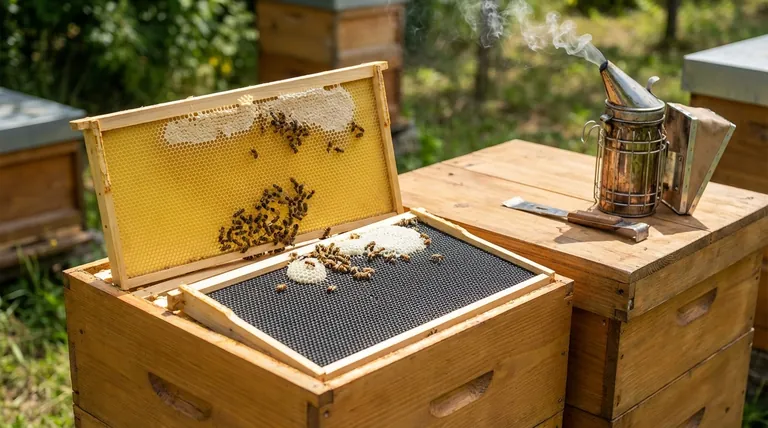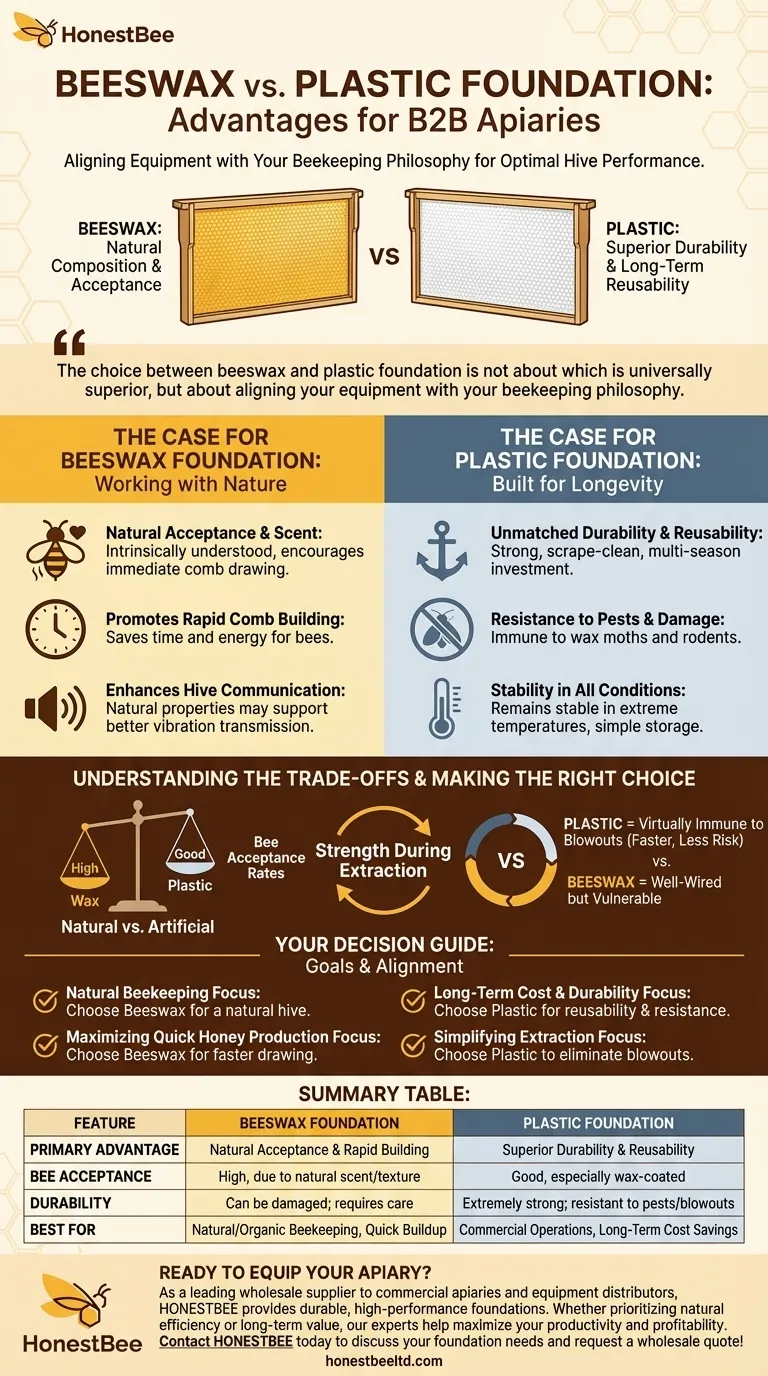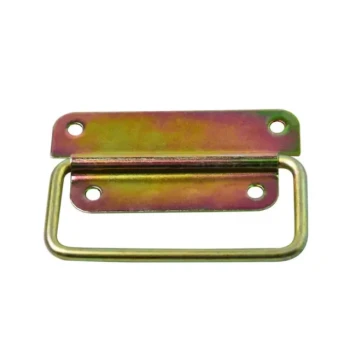The primary advantage of beeswax foundation is its natural composition, which bees readily accept, while the primary advantage of plastic foundation is its superior durability and long-term reusability. Beeswax foundation appeals to a bee's natural instincts, encouraging faster comb building due to its familiar scent and texture. Plastic foundation, in contrast, offers the beekeeper unmatched strength, resistance to pests, and cost-effectiveness over time.
The choice between beeswax and plastic foundation is not about which is universally superior, but about aligning your equipment with your beekeeping philosophy. Your decision hinges on whether you prioritize a natural hive environment or operational efficiency and long-term durability.

The Case for Beeswax Foundation: Working with Nature
Beeswax foundation is the traditional choice, leveraging the material that bees naturally produce to give them a head start on building their home.
Natural Acceptance and Scent
Beeswax is a material bees intrinsically understand. Its natural scent and texture are highly attractive, encouraging them to immediately begin drawing out the comb.
This ready acceptance means less hesitation from the colony when a new foundation is introduced.
Promotes Rapid Comb Building
By providing a familiar base, beeswax foundation saves the bees a significant amount of time and energy.
They don't have to produce all the wax from scratch, allowing them to build out the comb and prepare for brood or honey storage more quickly.
May Enhance Hive Communication
Some evidence suggests that the natural properties of beeswax allow for better transmission of vibrations throughout the hive.
This can be a crucial element of bee communication, which a foreign material like plastic may not support as effectively.
The Case for Plastic Foundation: Built for Longevity
Plastic foundation was developed to solve some of the practical challenges associated with beeswax, focusing on strength and efficiency for the beekeeper.
Unmatched Durability and Reusability
Plastic is exceptionally strong and far less likely to be damaged during hive inspections or honey extraction.
Frames can be scraped clean and reused for many seasons, making them a highly cost-effective investment over the long term.
Resistance to Pests and Damage
Plastic foundation is completely resistant to damage from pests like wax moths and mice.
This is a significant advantage, as these pests can quickly destroy wax comb, especially when it is in storage.
Stability in All Conditions
Unlike beeswax, which can become brittle in the cold or warp in extreme heat, plastic foundation remains stable at any temperature.
This makes storage simple and reliable, ensuring your equipment is ready when you need it.
Understanding the Trade-offs
Neither option is perfect. Acknowledging the downsides of each is critical for making an informed decision that suits your management style.
The Natural vs. Artificial Debate
The most significant difference is philosophical. Beeswax is a natural, hive-derived product. Plastic is a synthetic material introduced into the colony, which is a non-starter for many purist or organic-certified beekeepers.
Bee Acceptance Rates
While bees will use plastic foundation (especially if it's coated in a thin layer of wax), they almost always accept and build upon beeswax foundation more quickly and enthusiastically. A colony may be slower to draw out plastic comb.
Strength During Extraction
A well-wired beeswax foundation is strong, but a plastic foundation is virtually immune to "blowouts"—where the comb breaks apart in the extractor due to the centrifugal force. This makes extraction faster and less risky.
Making the Right Choice for Your Apiary
Your specific goals should guide your selection. There is no single correct answer, only the best answer for your operation.
- If your primary focus is natural beekeeping: Choose beeswax foundation to provide your colony with the most natural environment possible.
- If your primary focus is long-term cost and durability: Choose plastic foundation for its reusability and resistance to pests and damage.
- If your primary focus is maximizing honey production quickly: Choose beeswax foundation, as bees tend to draw it out faster, accelerating the timeline for honey storage.
- If your primary focus is simplifying honey extraction and minimizing equipment loss: Choose plastic foundation to nearly eliminate the risk of comb blowouts.
Ultimately, aligning your foundation choice with your personal beekeeping philosophy and operational goals is the key to success.
Summary Table:
| Feature | Beeswax Foundation | Plastic Foundation |
|---|---|---|
| Primary Advantage | Natural acceptance & rapid comb building | Superior durability & reusability |
| Bee Acceptance | High, due to natural scent and texture | Good, especially when wax-coated |
| Durability | Can be damaged; requires careful handling | Extremely strong; resistant to pests and blowouts |
| Best For | Natural/organic beekeeping, quick colony buildup | Commercial operations, long-term cost savings |
Ready to equip your apiary with the right foundation?
As a leading wholesale supplier to commercial apiaries and equipment distributors, HONESTBEE provides the durable, high-performance foundations your operation needs to thrive. Whether you prioritize the natural efficiency of beeswax or the long-term value of plastic, our experts can help you select the best equipment to maximize your productivity and profitability.
Contact HONESTBEE today to discuss your foundation needs and request a wholesale quote!
Visual Guide

Related Products
- Food Grade Plastic bee Foundation for Bee Frames
- Professional Frame Preparation: The HONESTBEE Electric Wire Embedder
- Beeswax Foundation Sheets Beehive Foundation for Wholesale
- Manual Beeswax Comb Foundation Machine Wax Foundation Mill Embossing Machine
- Boardman Entrance Bee Feeder Durable Galvanized Steel and Wood Construction for Beekeeping
People Also Ask
- How does the use of wax-coated foundations improve production efficiency? Boost Your Commercial Apiary Yield
- How long do beeswax sheets last? Extend Their Life Beyond a Year with Proper Care
- What is the benefit of high-temperature sterilized beeswax foundation in preventing AFB? Protect Your Hives Today
- How do bees respond to wax or wire foundations vs. plastic? Achieve Faster Comb Building
- What are the potential health concerns associated with using recycled beeswax foundation? Protect Your Hive Biosecurity
- What is the function of artificial beeswax comb foundations? Boost Apiary Yields and Hive Health Management
- What is the benefit of high-frequency replacement of Wax Foundations? Enhance Hive Hygiene and Honey Purity
- What hygienic function does the regular replacement of Hive Foundation serve? Improve IPM and Honey Bee Health



















